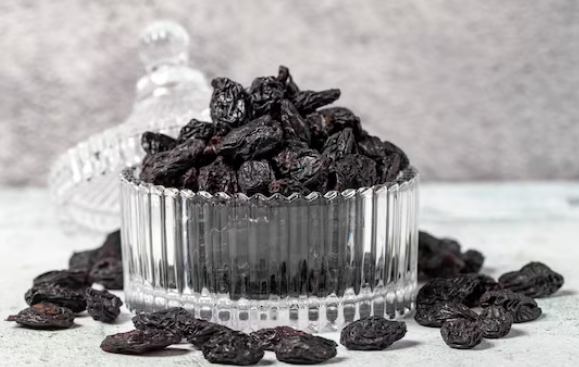Moisture Retention Challenges in Jumbo Black Raisins: Why Larger Size Means Higher Risk in Sea Freight
Introduction to Moisture Risks in Jumbo Black Raisins and Sea Freight
Shipping jumbo black raisins across seas introduces unique challenges that smaller raisin sizes do not face. The larger size of these raisins naturally holds more moisture, increasing the risk of spoilage during transit. Understanding why jumbo raisins retain more moisture and how sea freight conditions amplify this problem can give importers and exporters a clear advantage in maintaining product quality. This article explores the science behind moisture retention, its impact on sea freight logistics, and practical steps to reduce risks effectively.
Why Larger Raisins Retain More Moisture and Its Impact on Quality
Moisture retention is a key factor affecting the shelf life and quality of dried fruits. Jumbo black raisins, due to their larger size and thicker skins, retain water more deeply inside their pulp. This means that standard drying methods, often optimized for smaller raisins, may not fully remove internal moisture from jumbo raisins. When moisture remains trapped, it creates an environment conducive to mold growth, fermentation, and discoloration.
Sea freight conditions exacerbate this issue. Containers on ships often face fluctuating temperatures and high humidity levels, which cause moisture to migrate within the cargo. Jumbo raisins, already holding more water internally, absorb additional moisture or fail to release it efficiently. This can lead to spoilage that is difficult to detect until after arrival.
To check the price and product details of Mavis , please visit the pink link.
Sea Freight-Specific Conditions That Increase Moisture Risks for Jumbo Raisins
Several factors during sea freight contribute to moisture problems:
Humidity Levels Inside Containers
High humidity, often above 70%, accelerates moisture absorption. Without proper ventilation or humidity control, raisins can absorb moisture from the air.
Temperature Fluctuations
Temperature changes cause condensation inside containers. This water can settle on raisins and increase moisture levels.
Ventilation Challenges
Poor air circulation traps moist air around the product, preventing drying and encouraging mold.
These factors combined create a perfect storm for moisture retention issues, especially for jumbo black raisins.
Steps to Reduce Moisture Retention Risk in Jumbo Raisins During Shipping
1. Optimize Drying Processes for Larger Raisins
Extended drying times or specialized drying techniques can help remove deeper moisture from jumbo raisins before packing.
2. Use Moisture-Resistant Packaging Materials
Packaging that prevents external moisture ingress and allows controlled ventilation can protect raisins from humidity.
3. Control Shipping Container Environment
Employ temperature-controlled containers or humidity absorbers such as desiccants to maintain stable, dry conditions.
4. Monitor Moisture Levels Regularly
Pre-shipment moisture testing and post-arrival quality checks ensure raisins meet moisture standards.
Consequences of Ignoring Moisture Retention in Jumbo Black Raisins
Failing to address moisture retention leads to multiple issues:
- Mold growth damaging product appearance and safety
- Fermentation causing off-flavors and spoilage
- Reduced shelf life, leading to economic losses
- Customer dissatisfaction and damaged business reputation
Understanding these risks helps importers and exporters prioritize moisture control as a critical part of their supply chain.
read more: Iran’s Climatic and Agricultural Advantages in Producing Export-Quality Mavis Raisins
Conclusion: Managing Moisture for Better Jumbo Raisin Shipping Outcomes
The larger size of jumbo black raisins inherently carries higher moisture retention risks during sea freight. By recognizing the interplay between raisin size, drying processes, packaging, and shipping conditions, businesses can reduce spoilage and maintain product quality. Implementing these measures offers a competitive edge in the bulk raisin market, ensuring shipments arrive in optimal condition.
Frequently Asked Questions about Moisture Retention in Jumbo Black Raisins
Why do jumbo black raisins hold more moisture than smaller raisins?
Larger raisins have thicker pulp and skin, which traps moisture inside, making them harder to dry completely.
How does sea freight affect moisture levels in raisins?
Sea freight containers experience temperature and humidity changes that can increase moisture inside the cargo, worsening retention issues.
What packaging options help prevent moisture problems in jumbo raisins?
Moisture-resistant packaging with ventilation and the use of desiccants helps control humidity around raisins.
How can moisture levels be tested before shipment?
Moisture meters specifically designed for dried fruits can measure internal moisture content to ensure it meets safe shipping standards.
What happens if moisture is not controlled in jumbo raisin shipments?
Uncontrolled moisture can lead to mold, fermentation, spoilage, and significant product and financial losses.

